"If they have no bread, let them eat cake"
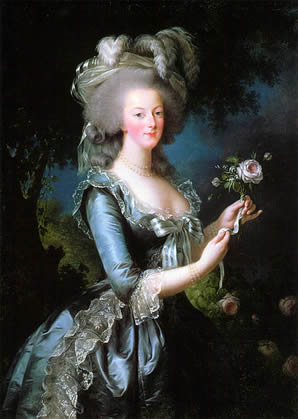 Marie Antoinette, Queen of France
Marie Antoinette, Queen of France
Marie Antoinette, the Queen of France from 1774 to 1792, was not an angel and did not exactly have a nice personality. Ultimately however it was barefaced lies which led to her tragic end, and in her deepest distress, at her darkest hour, even Marie Antoinette's enemies were impressed by her dignity and composure.
Marie Antoinette assumed the title of Queen of France when her husband, Louis XVI of France, ascended the throne in May 1774. Initially charmed by her personality and beauty, the French people generally came to dislike her, accusing "L'Autrichienne" (meaning the Austrian (woman)) of being spendthrift, immoral, and of harboring sympathies for France's enemies, particularly Austria, her country of origin. The Diamond Necklace incident damaged her reputation further, although she was completely innocent in this affair. She later became known as Madame Déficit because of her lavish spendings during famine times.
In the mean time the country and the state had been in decline finally sinking to rock bottom. Louis XVI, an honest man, and not by nature bad, nevertheless lacked the determination and skill to push through the necessary reforms. Well-meant actions such as the restoration of parliament resulted in the opposite of what he had hoped for. The establishment which controlled parliament stubbornly opposed the curtailment of their influence.
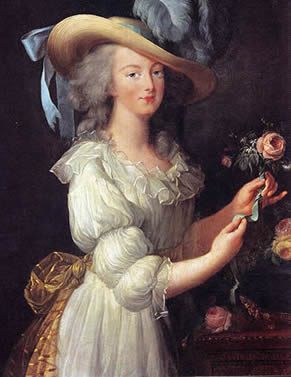 Marie Antoinette, portrait of the queen in a "muslin" dress. This controversial portrait was viewed by her critics to be improper for a queen.
Marie Antoinette, portrait of the queen in a "muslin" dress. This controversial portrait was viewed by her critics to be improper for a queen.
Embodying the epitome of her perceived arrogance, the following anecdote spread like wildfire throughout France: riding around in her coach, Marie Antoinette was said to have asked why the people looked so unhappy. "Your majesty, they have no bread," she was allegedly told. It was indeed the case that the failed harvest of 1789 had made bread prices shoot through the roof; starvation loomed. But Marie Antoinette was said to have replied simply: "If they have no bread, let them eat cake." She probably never uttered these words. It is more likely that someone took them from the Confessions of philosopher Jean-Jacques Rousseau, France's most acclaimed writer at the time of the revolution. In this book, written between 1766 and 1770, an unnamed princess is heard to say the sentence, talking generally about the hungry. Nevertheless in France in 1789 everyone believed that such a cynical suggestion could only have come from Marie Antoinette. Pamphlets and plays defamed her throughout the land. It was even said that she indulged in incest with her son.
On 13 August 1792, the royal family was imprisoned in the tower of the Temple. At first their conditions were not extremely harsh but they were prisoners and were re-styled as "Capets" by the new-born Republic. The king was separated from his family and he was executed on 21 January 1793, at the age of thirty-eight.
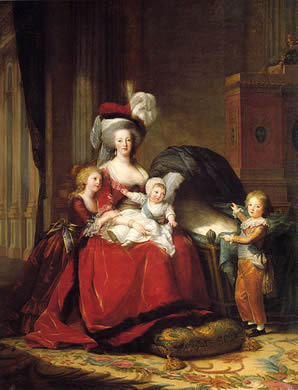 This State Portrait of Marie Antoinette and her children Marie Thérèse, Louis Charles (on her lap), and Louis Joseph, was meant to help her reputation by depicting her as a mother and in simple, yet stately attire.
This State Portrait of Marie Antoinette and her children Marie Thérèse, Louis Charles (on her lap), and Louis Joseph, was meant to help her reputation by depicting her as a mother and in simple, yet stately attire.
The result was that the "Widow Capet", as the former queen was called after the death of her husband, plunged into deep mourning and she refused to eat. Marie-Antoinette's health rapidly deteriorated in the following months. By this time, she suffered from tuberculosis and possibly uterine cancer, which caused her to hemorrhage frequently.
Despite her condition, the debate as to her fate was the central question of the National Convention after Louis's death. On 1 August, she herself was taken out of the Tower and entered into the Conciergerie as Prisoner No. 280. Despite various attempts to get her out, Marie Antoinette refused when the plots for her escape were brought to her attention. She was finally tried by the Revolutionary Tribunal on 14 October. Unlike the king, who had been given time to prepare a defence, the queen was given less than one day. Most of the accusations were untrue and probably lifted from rumours.
The most infamous charge was that she sexually abused her son. After being reminded that she had not answered the charge of incest, Marie Antoinette protested emotionally to the accusation, and the women present in the courtroom — the market women who had stormed the palace for her entrails in 1789 — even began to support her. She had been composed throughout the trial until this accusation was made, to which she finally answered, "If I have not replied, it is because Nature itself refuses to respond to such a charge laid against a mother."
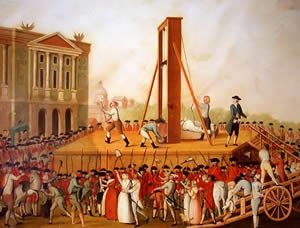 Marie Antoinette's execution on 16 October 1793
Marie Antoinette's execution on 16 October 1793
In reality, the outcome of the trial had already been decided by the Committee of Public Safety and she was declared guilty of treason in the early morning of 16 October, after two days of proceedings. Back in her cell, she composed a letter to her sister-in-law Madame Élisabeth, affirming her clear conscience, her Catholic faith and her feelings for her children. The letter did not reach Élisabeth.
On the same day, her hair was cut off and she was driven through Paris in an open cart, wearing a plain white dress. At 12:15 p.m. October 16, 1793, two and a half weeks before her thirty-eighth birthday, Marie Antoinette was beheaded at the Place de la Révolution (nowadays, Place de la Concorde). Her last words were "Pardon me sir, I meant not to do it", to Henri Sanson the executioner, whose foot she had accidentally stepped on after climbing the scaffold. Her body was thrown into an unmarked grave in the Madeleine cemetery. Her sister-in-law Élisabeth was executed in 1794 and her son died in prison in 1795. Her daughter returned to Austria in a prisoner exchange, married and died childless in 1851.
Discrimination among the different classes of people led to French Revolution
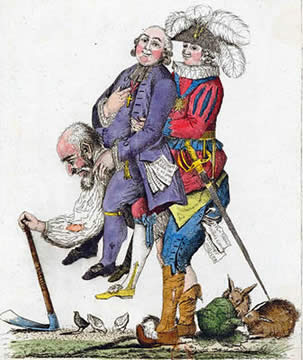 Caricature of the Third Estate carrying the First Estate (clergy) and the Second Estate (nobility) on its back.
Caricature of the Third Estate carrying the First Estate (clergy) and the Second Estate (nobility) on its back.
The French Revolution was a period of radical social and political upheaval in France from 1789 to 1799 that had a fundamental impact on French history and on modern history worldwide. One of the main reasons of the French revolution is social cause. The inequalities prevailing in the society created much discontentment among the masses and forced them to oppose the prevalent social structure. Years of deficit spending created a government that was deeply in debt. The money from the government had been spent on: The Seven Years’ War, The American Revolution, Bad harvests in the 1780s made it harder to recoup this money. To solve financial crisis the government had to increase taxes, reduce expenses, or do both.
During 1789, at the time of the revolution, the French people were widely diverse and the people were separated between three classes. The First Estate comprised 10,000 Catholic clergy and owned 5–10% of the lands in France—the highest per capita of any estate. All property of the First Estate was tax exempt. The Second Estate comprised the nobility, which consisted of 400,000 persons at the time, including women and children. Since the death of Louis XIV in 1715, the nobles had enjoyed resurgence in power. They had almost a monopoly over distinguished government service, higher church offices, army parliaments, and most other public and semipublic honors by the time of the revolution. Like the First Estate, they were not taxed by the principle of feudal precedent. The Third Estate comprised about 25 million people: the bourgeoisie, the peasants, and everyone else in France. Unlike the First and Second Estates, the Third Estate were compelled to pay taxes, but the bourgeoisie found one way or another to be exempt from them. The heavy burden of the French government therefore fell upon the poorest in French society—the peasantry, the working poor, and the farmers. There was much resentment from the Third Estate towards its superiors.